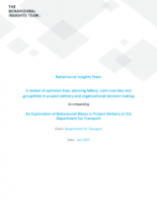This literature review provides an overview of three common cognitive biases in the context of project delivery and organisational judgment and decision making. The first, optimism bias, refers to the fact that we tend to overweight our odds of success, and under-weight our chances of failure, or of negative events happening to us. Planning fallacy can be considered a specific variant of optimism bias and describes the tendency to optimistically plan project timescales and resources and to overlook project risks. The second, sunk cost bias, refers to the fact that we are often influenced by past, sunk, costs which are irretrievable and have no bearing on future outcomes but which continue to distort our decisions. The third, groupthink, describes the ways in which group dynamics, and in particular social influence, may skew our judgment and decisions, often towards a more conformist, and less deliberative or questioning viewpoint.
This literature review is in support of a project commissioned by the Department for Transport (DfT), in which the Behavioural Insights Team (BIT) have been tasked with exploring the prevalence of these common biases in the planning and delivery of national transport projects, and developing a range of potential interventions. These three biases have been selected as the focus of the project due to the perception that they may be present, to some degree, within the current departmental project management and governance processes, and due to the relative wealth of existing research from which to draw.
